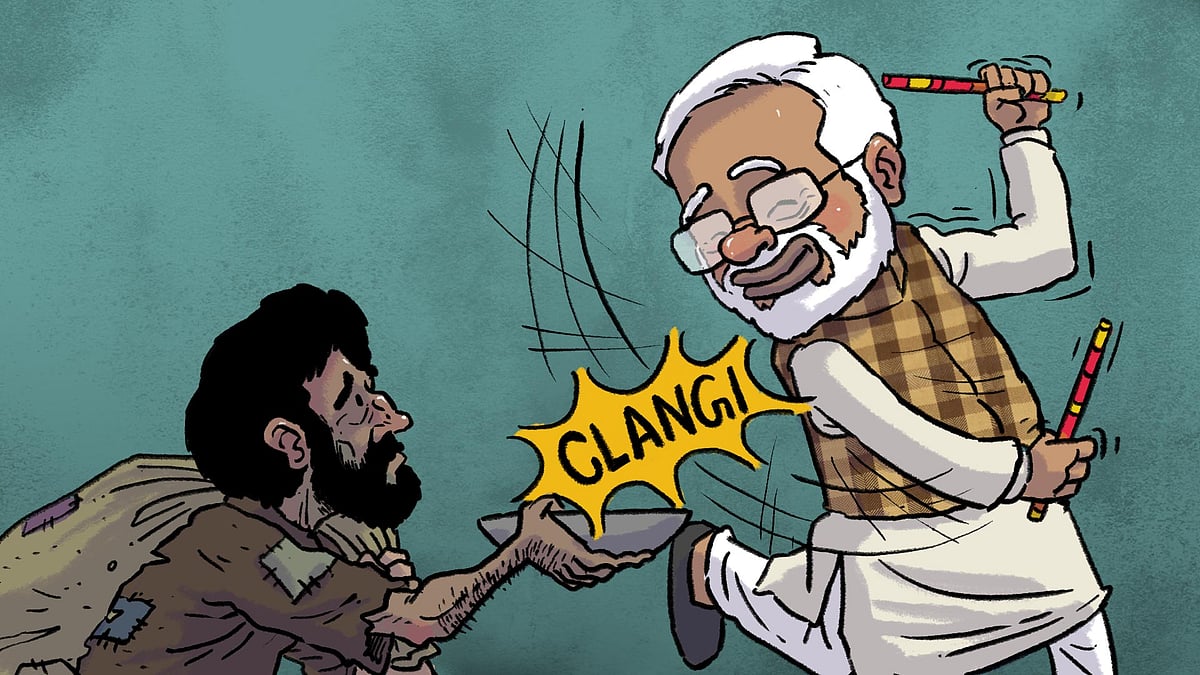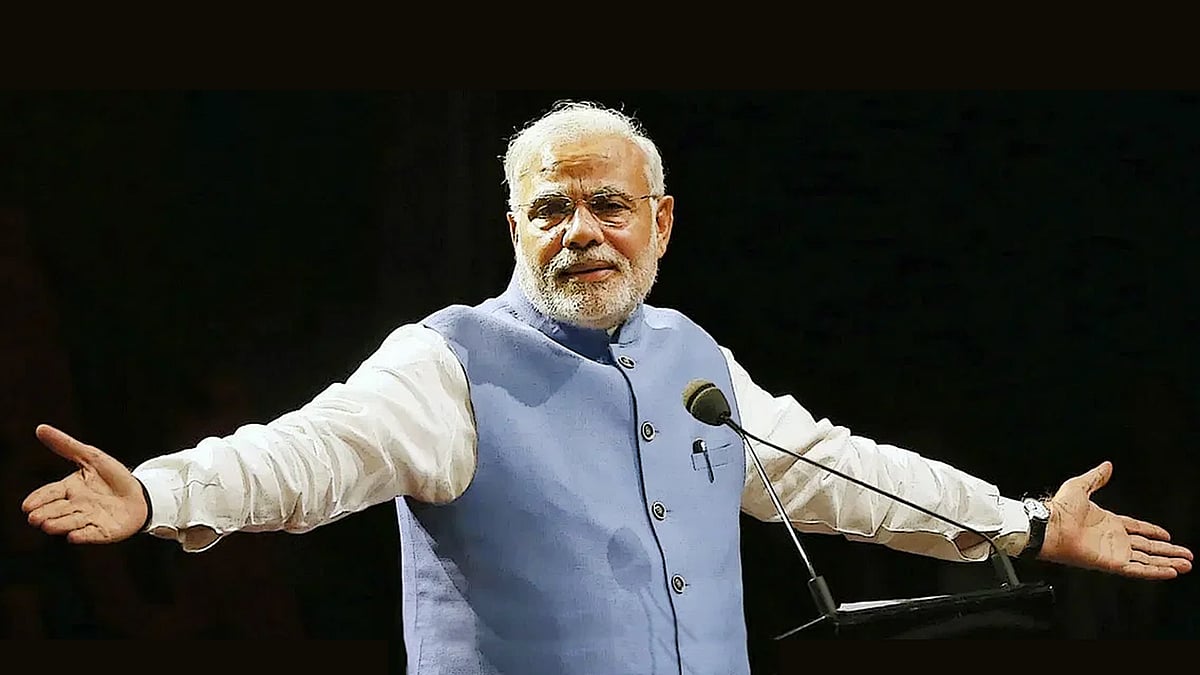How I learned to stop worrying and fell in love with our supreme leader
Narendra Modi’s greatest gift to us is that he makes us feel like we have done something without doing anything.
As I write this, I must confess that I have been one of those who have not just questioned our prime minister’s past, but also his ability to lead the nation. But something happened on March 22 that changed me: I saw the ebullience of our people, the sense of celebratory accomplishment of defeating the enemy that is coronavirus, and something moved in me. Here, I will try and break it down for those who still suffer, as I did, from not believing in the messianic appeal of the man that is Narendra Damodardas Modi.
No one can deny the beauty of a simple idea, and any of us who has had to sit through a reading of an academic paper knows how convoluted academic jargon can get. Therefore, one sympathises with the prime minister when he says hard work has more value than Harvard. However, sometimes the hard work of pushing against a wall goes unaccounted for, as physics (a Harvard invention) defines work done as force multiplied by displacement. Therefore, some may look at all the work done behind demonetisation or the great “corona thaali banging” as a big zero, because physics. But physics is a Harvardian thing and not something taught in the school of life where the power of our collective prayers reigns supreme.
See, Modi has been educated in the school of hard knocks, that is, he has learned less from books and more from life. He made it amply clear in his now famous phrase where he mentioned that he relies more on hard work than on Harvard. That a lot of the people who worked in this administration, from Raghuram Rajan to Arvind Subramanian, left due to differences of opinion also indicates that Modi relies not on outsider input like a nerd-puppet but on his gut instincts like a man, a simple single-celled man.
It might seem to the nonbeliever that nothing concrete was achieved from either demonetisation or the great corona utensil banging. But can one deny the effect of people across class coming together as a community to perform an almost religious exercise of invoking change from our past behaviour and moving to a better future?
In the case of demonetisation, it was the act of changing your old currency to a new one while the black money hoarders couldn’t. In the corona banging, it was about staying indoors for half a day and then coming out in a community celebration of victory over the virus. Of course, both events, while seeming innocently novel and harbinger of change, did in case of demonetisation and could in the case of the utensil banging lead to a scenario where a lot of people must suffer or die for nothing. But isn’t it all about the persuasive power of a simple idea, that no matter what happens to India from here on, we shall fight back together with the loudest of bangs, louder and with more celebratory fireworks than the Hindenburg.
It is only our prime minister and his mediapersons who can present even the Hindenburg as a light and fireworks show, and that is what hard work not Harvard will get you.
The greatest benefit of mimicking the ritualistic aspect of religion, as we did with this big bang, is that it helps people feel like they have done something without doing anything. It also makes people feel as if the government is alert and active despite it not taking concrete steps towards the overall safety of the nation. This group festivity is an ornamental act that will stay with people and make them feel something is being done. Rearranging the deck chairs on the Titanic must count for something, after all?
Looking at Whatsapp forwards, one has to say that Modi has indeed made all of us fill our hearts and gut with immense pride. This festivity allows the Ambanis and the Bachchans and all of us privileged enough to keep living our lives in relative comfort to feel as if we contributed. I am sure Modi feels the same way.
The greatest gift Modi has given the privileged is importing religious rituals into public life, be it this act of festivity around corona or the standing in a queue to get new currency in the past. Mukesh Bhai can stand on his terrace and bang all his pots and pans, and the PM can make a Bollywoodesque scene of his mother queuing up to get her currency converted because these acts require nothing from them and yet have an impact: they can make ordinary people feel they are on an equal footing with those the extent of whose privilege they can’t even comprehend.
Is this sense of emotional egalitarianism nothing? Karl Marx died for this.
Modi might have no policy measures, but he does have events that can be used to paper over the lack of them. Just like after demonetisation, when it felt like a collective moment of change had occurred even though it was a lot of wall-pushing with no displacement. If a few people do die in the future (looks unlikely from reading the Whatsapp forwards my friends send me) nobody would be able to blame the PM for his lack of effort because we participated in a collective act of dancing.
Can there be anything simpler, yet more joyous than celebrating Diwali in March?
In the past, I believed a good policymaker was one who understood the unseen impact of his policy as well as the seen part. Basically, any act or policy or law will birth not only an immediate effect, but a series of effects. Of these, the first effect manifests with its cause – and so it is seen. The others unfold over time in succession – they are not seen. The whole difference between a good and a bad policy planner lies here – a good planner considers not just the visible effect but those which it is necessary to foresee.
I used to think this difference was huge, for it almost always happens that even when the immediate consequence may be slightly favorable – as in the sense of belonging to a community – the ultimate consequences are perhaps fatal. It follows then that the bad policymaker pursues a small present good, which will be followed by a great evil, while the true policymaker pursues a great good to come, sometimes at the risk of a small present evil. I thought history would judge our policy decisions much better, but the evidence in front of us, from GDP to demonetisation to the response to Covid-19, does leave scope for improvement.
I thought the above to be true but what I failed to see was the “felt” aspect of policymaking that no school of public policy teaches you: how did the policy make the people feel? We have to agree that here Modi is a policymaker par excellence. Only he could ask Mrs Lincoln, “Did you at least enjoy the play?” And that is where his inspirational greatness lies: India is Modi ji’s Mrs Lincoln and he’ll make sure you like the play.
With the corona banging, the PM proved yet again that the power of a ritual can solve anything, even something as complex as the problem of ill-equipped healthcare workers treating highly contagious patients. It was like how he made a mass media event out of giving away his social media accounts on Women’s Day and, in the process, solved all gender bias and sexism. One cannot but marvel at this political genius’s ability to make everything about himself, like an abusive ex, except that he loves us.
The truth is whatever has happened in the last six-odd years, one thing has always been there with us: this sense of a cozy joy inside our warm hearts of doing something together. He has made us understand that if we believe hard enough, we can make two and two into five, and all our family Whatsapp groups shall believe it. If you do not believe me, ask your aunt about Revati Nakshatra. We stood in queues to get our currency notes changed but felt like we were soldiers deployed in Siachen, and those notes were weapons annihilating the enemy that was black money, and by Jove we did, all 0.03 percent of it.
Then we jumped with joy when Modi ji was able to pressure, nay scare, the Pakistanis into giving us back our Abhinandan, captured by deceit, and accept once and for all the military superiority of the Indian armed forces. And now, all of us stand on streets and roofs and balconies, be we an Ambani or an Aam Aadmi; even Priyanka Chopra did her bit from the sunny Los Angeles, clapping in solitude but with all of us in spirit.
So, next time you laugh at the video of that lady banging her plate like a delirious concert goer, remember that she has consumed ecstasy, not the drug but of reverential love, and feels no different than the people crying at the Wailing Wall or the Sistine Chapel, or at any place of religious significance.
Modi ji is the sildenafil that the nation needed, and we cannot have enough of him, no matter our cardiovascular risk. And amidst all this excitement, if you are confused about reality, just hold on to a plate and tell your beating heart, “Sab changa si", as I did.
Oh, cruel, needless misunderstanding! Oh, stubborn, self-willed exile from the loving breast! But it is all right, everything is alright, the struggle is finished. I have won the victory over myself. I love the supreme leader.
 Why India doesn’t seem to care about its poor even during a pandemic
Why India doesn’t seem to care about its poor even during a pandemic How the Hindu man’s crisis of masculinity fuels Hindutva
How the Hindu man’s crisis of masculinity fuels Hindutva